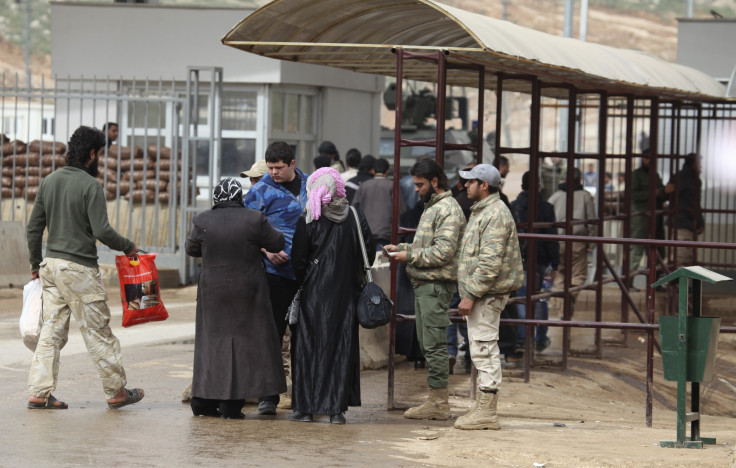Turkey Arrests One ISIS Suspect, But Its Ability To Stop Fighters Remains Doubtful

Turkish officials announced Wednesday they had arrested a Turkish man suspected of working with the Islamic State group in Syria. More than six months into the international campaign against the group, it was the first arrest of a Turkish individual suspected of joining the Sunni militant organization, despite the hundreds of Turkish citizens known by the government to be affiliated with the group.
Musa Göktaş, a 38-year-old man from Ankara, illegally crossed into Syria in October with his 15-year-old twin sons to join the jihadist group, authorities said. He was arrested in late January on his way back to Turkey. He reportedly wanted to return to Ankara to pay off outstanding debts. According to Turkish media, Göktaş told the court he had religious education when he joined the group and worked in a kitchen making meals for ISIS militants. He said he never took part in armed conflict.
Turkish foreign minister Mevlüt Çavuşoğlu recently said that as many as 700 Turkish citizens were suspected of fighting with the Islamic State group, but so far security officials have successfully tracked down only one of them. That raises questions among analysts as to whether Turkey has the ability, or the will, to fight ISIS.
Clint Watts, a senior fellow at the Foreign Policy Research Institute and expert on tracking foreign fighters, said it is unusual that Turkey has only arrested one person linked to ISIS, considering the country’s security officials control the main route into Syria.
“Why did they choose to target this man out of all the others?” he said. “It is strange that he was the one that was picked out.”
It is still unclear how Turkish officials tracked down Göktaş or knew he joined the Sunni militant group. Turkish government sources who spoke on condition of anonymity told the International Business Times that Göktaş’ wife filed a request with the local police to find her husband.
The arrest of Goktas brings into question if Turkish officials have been doing everything they can to stop not only their own citizens from entering Syria to join ISIS, but also foreigners.
Çavuşoğlu said Thursday that since Turkey ramped up its security on the border several months ago, officials have stopped about 9,915 foreigners planning to join ISIS from entering Syria, and that 1,160 of them were deported. But there is no publicly available record of the deportations.
President Recep Tayyip Erdogan said in October at the World Economic Forum in Istanbul that airstrikes in Iraq and Syria are not enough. "They will only provide a temporary solution," he said. He called on the international community to implement a no-fly zone and a buffer zone and increase finances to train and equip groups opposing the Islamic State group in Iraq and Syria.
Despite Erdogan's remarks, it took the U.S. weeks to finally get Turkey actively involved in the coalition. Turkish officials said the country had its hands full managing nearly a million displaced Syrians in camps near the border. Unlike other countries, such as Jordan, where the refugee camps are managed by international aid organizations like the United Nations' UNHCR, all refugee camps in Turkey are under the control of the government.
Senior U.S. officials, including Secretary of State John Kerry and Vice President Joe Biden, have pressed Turkey to help the international community stop the flow of foreign fighters.
"Foreign fighters have never entered Syria from our country," Erdogan said in October. "They may come to our country as tourists and cross into Syria, but no one can say that they cross in with their arms."
But following the deadly attacks in Paris last month, one of the people implicated crossed into Syria via Istanbul. The suspect, Hayat Boumeddiene, 26, is now most likely living in Raqqa and working with ISIS.
The warning about Islamist militants on the porous border between Syria and Turkey came as early as March 2012. A black flag, which then became the emblem of the Islamic State group, flew on a pole next to the Bab al-Hawa checkpoint, one of the main entryways into Syria from Turkey. Now Eastern Turkey, including the cities of Antakya and Kilis, has become a main transport hub not only for foreign fighters into Syria, but also for weapons, money and supplies.
According to documents leaked last month and cited by Middle East news site Al Monitor, trucks escorted by Turkish intelligence service officers transported missiles, mortars and anti-aircraft ammunition into Syria in January. The Gendarmerie General Command alleged that the trucks were "carrying weapons and supplies to the al Qaeda terror organization," whose offshoot in Syria is Jabhat al-Nusra. The Turkish government obtained a court injunction and banned all reporting on the affair.
Since the documents surfaced, President Erdogan and government officials have said the truck was carrying humanitarian assistance to ethnic Turkmens in Syria.
© Copyright IBTimes 2024. All rights reserved.




















